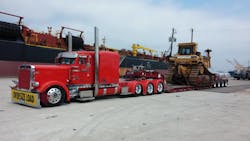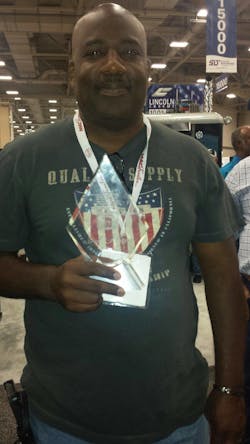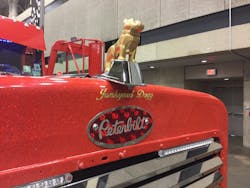Houston-based specialty flatbedder Von “VL” Harris grew up around trucking and in the shop. American Trucker met Harris in Dallas where he’d entered his 1990 Peterbilt 379 in the Pride & Polish competition.
It was, Harris reported at the time, the first show appearance of his everyday truck. But the big red Pete stood out among even the highly-chromed and little used show ponies on the trophy-rig circuit for a couple of reasons.
First, the truck could be the only Pete on the road with a Mack bulldog hood ornament, and the rig shares Harris’s nickname, “Junkyard Dogg.” More noteworthy, especially in contrast to the more intense show truck competitors who display past prizes, this Pete instead displayed a dozen or more framed photographs of loads.
Harris, we quickly learned, is proud to be an independent trucker and considers himself an expert in transporting some very heavy machinery to and from the ports on the Gulf of Mexico.That expertise is based on 27 years as an independent trucker, along with his having the business in his blood. His grandfather owned a small construction company, his father was a truck driver and his uncles were mechanics with their own shop.
“I grew up around entrepreneurs. Being black, I came up more fortunate than some in that era. I saw role models. When the ’dozer breaks, we’re working on the ’dozer. If the dump truck breaks down, we’re working on the dump truck. Even when I was young, in the summertime I would go to work with them and I got paid. I was always told that you don’t depend on anybody else, you learn how to do it yourself. It doesn’t matter if you mess it up, you keep on doing it until you learn how to do it right. That’s my mentality now.”
Harris figures his passion for trucking, as with many others who make a career out of it, stems from being around trucks as a little boy. He fondly recalls getting in his father’s truck when it was in the yard and “playing truck driver.”
Experience is everything
And, as does John Wieczorek, Harris suggests young truckers can and should benefit from the experience of veterans—only he’s not seeing much anymore.
“When I was coming up, if you did something wrong—even just changing lanes—the old-timers would say, ‘hey, man, what’s your problem?’ Your blinkers not working?” Harris recalls. “People would talk to you on the radio and tell you the right way to do things, how to tie your load down—more is better, less is no good. And we wanted to learn. Nowadays with these drivers, it’s a job. It’s not a career like it was for me. There’s a difference between a job and career. Some of them don’t care.”
And it’s obvious when you look at some of the equipment on the road.
“I can go in the scale house and I have to beg them to DOT me—but they’ve told me straight up I’m wasting their time because they can’t make any money with me. My truck and trailer is like a show truck. But I keep it that way for me, for the pride that I have,” he says.
The key, obviously, is to be willing to invest in the top equipment and maintain it properly. But that’s easier said than done. Harris emphasizes the importance of having an equipment purchasing plan and budgeting for it. And that means saving money in advance—not in buying now and paying later.
Because he can do virtually all of his own mechanical repairs and even paint and body work, Harris does get a break on maintenance expenses. But he still has to understand the marketplace, and he’s developed a broad customer base and knows which brokers he can rely on.
“I don’t waste a lot of money. When we make it we try to save it because there are going to be some rough days. A lot of new owner-operators don’t understand the process,” Harris says.
And he speaks from experience, noting that his trucking business has gone broke four times during several Texas oil booms and busts, in addition to regular seasonal slowdowns in heavy haul. That includes building up his own fleet to 75 trucks in the 1990s—a business he lost when fuel and insurance soared suddenly in the 2000s. What had been an easy 8% profit quickly became a 10% operating deficit.
“It took the fourth time for me to make myself quit throwing money away,” Harris says.
Know your costs
He’s also learned to carefully weigh his operating costs when considering how to price his loads, and always to arrange back hauls in advance. He also doesn’t buy fuel on credit, and immediately deducts the cost from the amount he’s banking for the trip.
“Trucking is load to load, week to week, how you survive,” Harris says. “I’ve tried it all kinds of ways, and credit is no good. If you pay as you go, you’ll never go broke.”
And for company drivers looking to become independent, “the right coaching” is critical, he explains—and that means finding someone who’s been around at least 20 years. (And he’d also like to see companies pay to keep experienced pros in the cab with trainees for a full 3 months.)
Harris suggests that beginning owner-ops should carefully select what and where they haul based on knowledge of the marketplace where they live.
“You need to find a niche,” he says. “If you live in Louisiana and down the street is a lumber mill, that’s a niche.”
Similarly, beginners should look for regional opportunities, and stay within 500 mi. of home. The risk of something going wrong well outside any support network are too great in long haul, and a new owner-operator could find himself quickly back in a company truck—with lots of bills to pay.
And, again, pay as you go.
“That’s going to censor your spending,” he says, and explains that all operating and living expenses need to be taken out of every load payment. And, especially early on, anything that’s left needs to go into a savings account.
“That means no bass boats, no motorcycles, no race cars—until you build up a comfort zone, say $10,000,” Harris says. “Then maybe instead of putting $300 in the savings you just put $100, and maybe start saving up to buy some toys.”
About the Author
Kevin Jones
Editor
Kevin has served as editor-in-chief of Trailer/Body Builders magazine since 2017—just the third editor in the magazine’s 60 years. He is also editorial director for Endeavor Business Media’s Commercial Vehicle group, which includes FleetOwner, Bulk Transporter, Refrigerated Transporter, American Trucker, and Fleet Maintenance magazines and websites.
Working from Beaufort, S.C., Kevin has covered trucking and manufacturing for nearly 20 years. His writing and commentary about the trucking industry and, previously, business and government, has been recognized with numerous state, regional, and national journalism awards.



